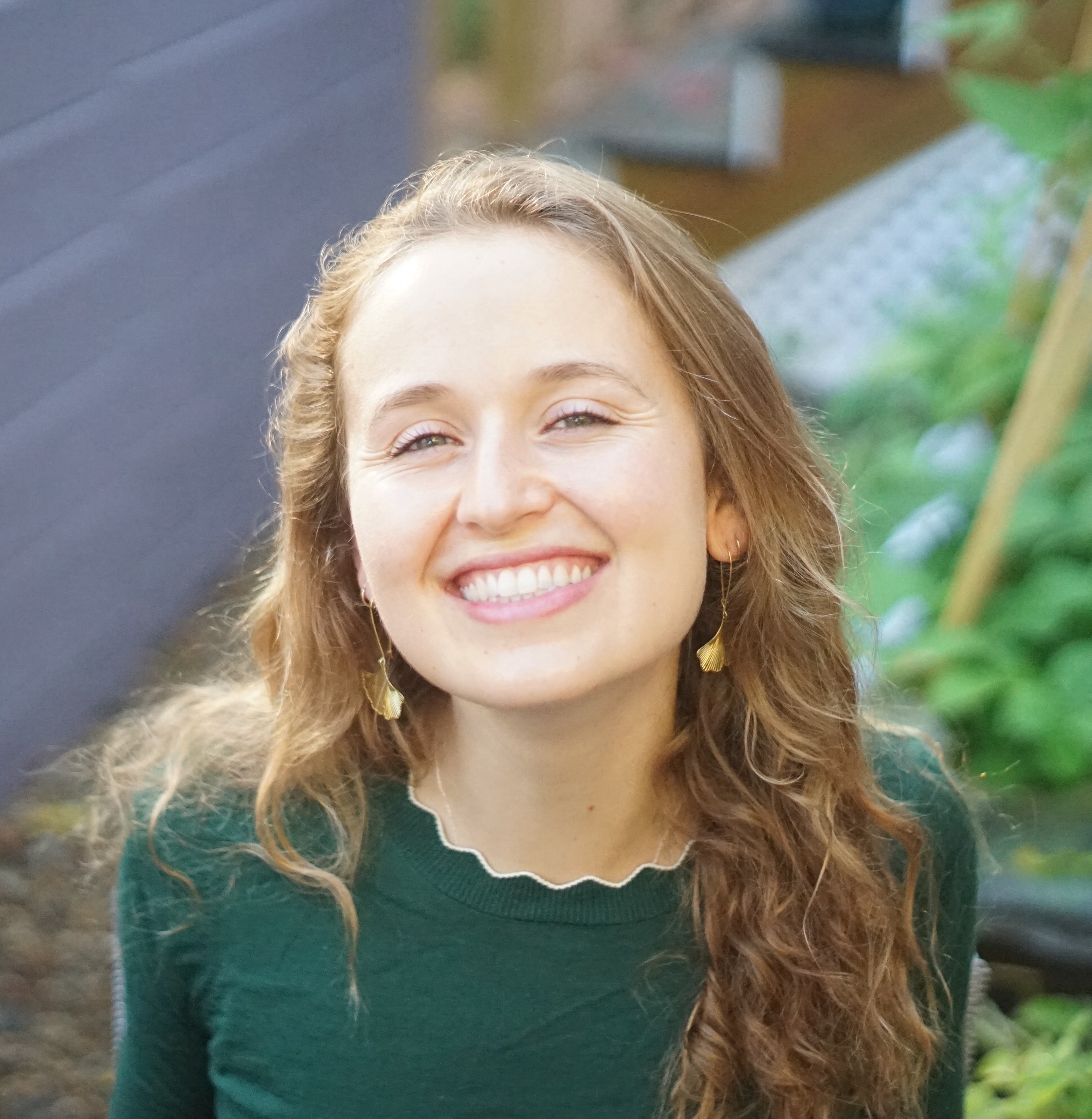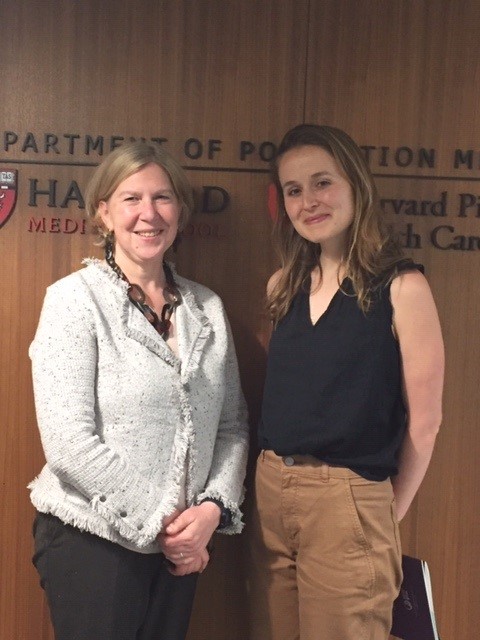2024 Fletcher Prize Award Winner Announced

We are pleased to announce that Claire Quinlan, a Harvard Medical School student, has been selected to receive the annual Fletcher Prize in Population Medicine. Driven by her interest in infectious disease and geriatrics, and commitment to using quantitative methods to fill existing gaps in evidence-based care, she penned her winning submission, “When the Epidemic Ends, Our Work Begins: HIV Primary Care & Global Demographic Change”. In the paper, she advocates for a greater geriatric focus in medical education that also encompasses caring for those having lived with chronic conditions such as HIV. But don't just take our word for it - you can read it online now in the Journal of the American Geriatrics Society.
We spoke with Claire to learn more about the genesis of her paper, how she plans to take steps within her own clinical practice to address the challenges faced by an aging HIV population, and the role mentorship played during her time at HMS.
Q: Tell us about your paper. What drew you to the topic?
A: My interest in geriatrics and infectious disease began with a patient I saw with my internal medicine preceptor at Cambridge Health Alliance during my clerkship year. We had a growing cohort of older patients who arrived at our geriatric clinic with "teenage" diseases: HIV, Cystic fibrosis, Type 1 diabetes, systemic lupus erythematosus. The large numbers of these patients in a geriatrics clinic was surprising to me: I was taught as a medical student about the narrow age distribution of these conditions, and typical board exam questions similarly described younger patients suffering from them. However, as we have improved our antibiotic, antiviral, and anti-inflammatory medical therapeutics, as well as our primary care to implement these treatments, these "teenage" diseases have become chronic conditions that our patients carry with them as they age. Back at CHA, as we took care of a number of older patients with HIV, I started to consider the complexity of treating their HIV along with their other comorbid conditions. Not only are novel drug-drug interactions a concern, as I wrote about in the essay, but these patients also have lived through an epidemic where most lost close friends and family. I hoped that by improving our understanding of the geriatric care of these individuals, we could prevent them from experiencing further harm.
By expressing an interest in working with this population, I also hope to follow their lead and pursue the further training I will need to provide the best care for them.
Q: You discuss the strides that have been made since HIV’s appearance in the early 1980’s, along with the unique challenges the medical community now faces in treating an aging HIV positive population. What are some next steps you hope to take in your own primary care practice in relation to this especially vulnerable population after graduation?
A: In my primary care practice, I hope to recognize and acknowledge the compounding burden of age with chronic infectious disease-not only is medication interaction a large risk, but so is chronic medication toxicity, and metabolic aging that can make polypharmacy a primary issue for these patients. These issues have led to undertreatment of older adults for deadly diseases. New therapeutics for COVID-19 such as nirmatrelvir-ritonavir (Paxlovid) were widely underutilized in older adults, perhaps due to a similar concern for drug-drug interactions, despite the 140x higher risk of death from COVID-19 in these patients aged 75-89 compared with those aged 18-29 (CDC COVID-net). Practically, this means considering deprescribing with each of my patients, and remaining especially vigilant with new geriatric populations like those with HIV.
By expressing an interest in working with this population, I also hope to follow their lead and pursue the further training I will need to provide the best care for them: high-resolution anoscopy, medication for substance use disorders, and supporting the search for safe housing. I also hope to work with this cohort of patients on a population level: continuing pharmacoepidemiologic research in the Medicare population to develop clinical guidelines on prescription of anticoagulants and other common medications with patients' ART regimens in order to keep them safe.

Q: You acknowledge your mentor, Dr. Avorn – what role has mentorship played in your research?
A: This project began in a course at HMS called Medications and Evidence, where I worked with researchers and physicians at the Brigham Department of Pharmacoepidemiology on a large-scale comparative observational research study where I was given the freedom to explore my clinical question: the risks of concurrent antiretroviral and anticoagulant therapies in older adults. From the beginning, Dr. Avorn encouraged me to take this classroom project to the real world. Dr. Lin and Dr. Avorn at the Department of Pharmacoepidemiology have advised and supported me as I wrote and defended an honors thesis on this topic, and I am grateful to them for their patience and encouragement as I learned how to go from a clinical question to a completed research project.
I also want to thank my parents, two younger brothers, and partner for listening and questioning as I have wondered about this topic the past few years.
Congratulations, Claire!
About the Fletcher Prize in Population Medicine
The Fletcher Prize, named for Department of Population Professors Emeriti Suzanne and Robert Fletcher, who are national leaders in advancing the field of clinical epidemiology, is awarded by the Department for the best paper on a topic in Population Medicine written by a Harvard Medical School or Harvard School of Dental Medicine student. Papers are judged by an expert panel of DPM faculty and awarded with a $1000 prize. Learn more about the Fletcher Prize.
About the 2024 Fletcher Prize in Population Medicine Winner
Claire Quinlan is a fourth-year medical student at Harvard Medical School. Claire matched into Internal Medicine Primary Care at the University of Washington in Seattle, WA and will begin residency in June 2024. Claire is interested in infectious disease and geriatrics, and is committed to using quantitative methods to fill existing gaps in evidence-based care. During medical school, she completed an elective in epidemiology at the Centers for Disease Control and Prevention in Atlanta, where she conducted research on COVID-19 antiviral uptake in older adults. She also worked with the MIT AgeLab on caregiver preventative health, and interned at the Massachusetts State Legislature to propose models for electronic end-of-life planning statewide. Claire has brought Spanish-speaking older adults into cross-cultural exchange with interested language learners at HMS through the Amigos Entre Las Generaciones program. She hopes to bridge clinical work and epidemiology in her future work as a primary care and infectious disease physician.
Prior to medical school, Claire worked for the Wyoming Department of Health, investigating the barriers to aging in place for older ranchers. When COVID rates began to rise in the state, she supported the coordination of COVID test kits from frontier nursing homes to Cheyenne’s public health lab.
Outside of medical school, Claire loves lake swimming, mandolin playing, and square dancing. She is also part of a Cambridge Bike Clinic Skills Group for older adults to increase their confidence and mobility in cycling around the city.
CATEGORIES
Awards and Achievements